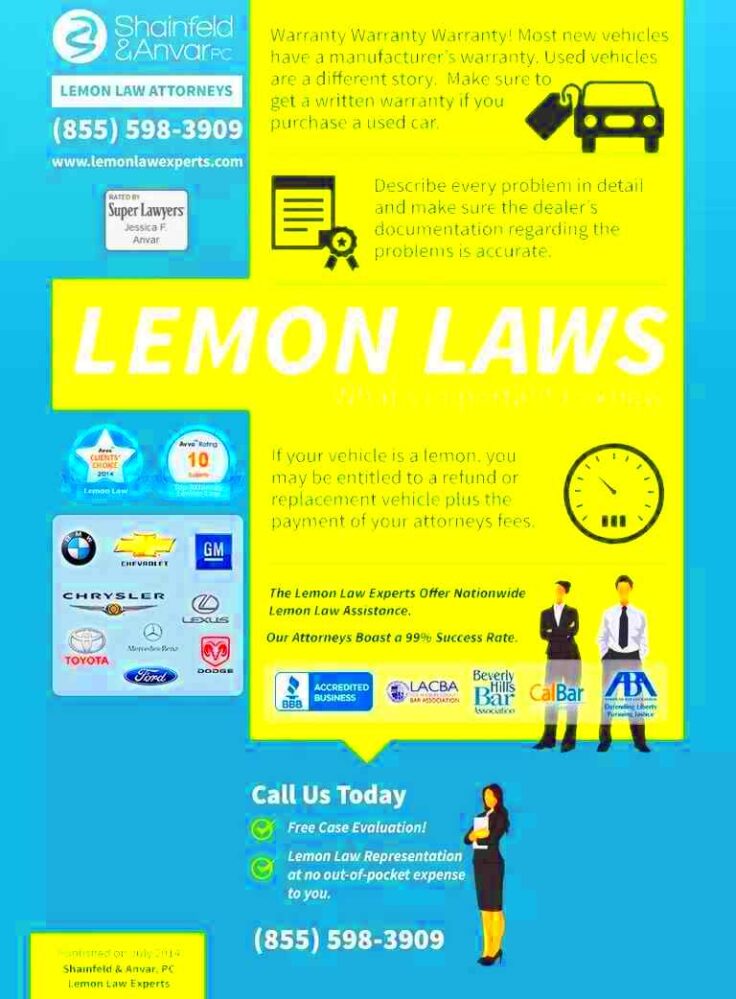Do Lemon Laws Cover Appliances and How They Apply
These laws are beneficial for consumers, but their implementation can be somewhat tricky. They differ across states and can encompass various product categories. Originally lemon laws were mainly concerned with vehicles but as consumer protection efforts grew many states began to include other items as well. This development in lemon laws makes it challenging for consumers to grasp their scope and application.
What Lemon Laws Typically Cover
Lemon laws are commonly associated with protecting consumers in the automotive industry. Here’s a brief overview of the scope of these regulations.
- Vehicles: This includes new cars, trucks, and motorcycles that have significant defects affecting their use, safety, or value.
- Repairs: If a vehicle has a defect that has not been fixed after a reasonable number of repair attempts, lemon laws often require the manufacturer to offer a replacement or a refund.
- Warranty Issues: Lemon laws typically cover issues that arise within the warranty period of the vehicle.
These regulations are in place to protect consumers from being stuck with a faulty product that doesn’t meet their needs or expectations. As we delve deeper it’s worth mentioning that although the spotlight is on vehicles lemon laws have gradually extended their coverage to include various other consumer products.
Do Lemon Laws Include Appliances?
You might be curious about whether lemon laws apply to appliances. Well, the answer is it varies depending on your location. In the past lemon laws didn’t extend to appliances such as refrigerators, washers or ovens. Nevertheless consumer protection laws have progressed and certain states now include appliances under more comprehensive consumer protection regulations.
As an example in certain states, lemon laws have been modified to cover significant home appliances as long as they meet certain requirements.
- Significant Defects: The appliance must have defects that significantly impair its use or value.
- Multiple Repair Attempts: The defect must persist despite several repair attempts.
- Within Warranty Period: The issues should occur within the warranty period of the appliance.
The coverage isn’t all encompassing. Numerous states still exclude appliances from their lemon laws forcing consumers to seek alternatives for resolution like state specific consumer protection laws or warranty claims. To get a grasp of the laws relevant to your region it’s advisable to consult local consumer protection agencies.
How Lemon Laws Apply to Appliances
Navigating the application of lemon laws to appliances can be challenging. Lemon laws were primarily created for vehicles but their concepts have been modified to tackle problems with various products, such as home appliances. The crucial aspect is grasping how these regulations can be extended to encompass appliances.
Often the way lemon laws are applied to appliances resembles the process used for vehicles.
- Defect Verification: The appliance must have a significant defect that impacts its functionality. For example, if a washing machine fails to clean clothes despite multiple repair attempts, it could be considered a lemon.
- Repair Attempts: There must be a reasonable number of attempts to repair the appliance. Typically, this means that if the appliance has been repaired multiple times for the same issue and the problem persists, you may have a valid claim.
- Warranty Period: The defect usually needs to occur within the warranty period of the appliance. This is crucial as lemon laws often tie their coverage to the warranty terms.
For a lot of buyers this involves dealing with the complexities of laws in their state to figure out if their appliance problem falls under lemon law protections. Seeking guidance from a lawyer who knows about consumer protection laws in your region is wise for personalized advice.
Steps to Take if an Appliance is a Lemon
If you ever find yourself dealing with an appliance that appears to be faulty there are a few actions you can take to address the situation. I personally went through this journey when my air conditioner acted up and I understand how overwhelming it can be. However there’s no need to fret; following the steps can lead to a positive outcome.
Here’s a guide on how to proceed:
- Document the Issues: Keep detailed records of all problems, repair attempts, and communications with the manufacturer or seller. This documentation is crucial for proving your case.
- Review the Warranty: Check the warranty terms to ensure that the defect falls within the coverage period. Understanding your warranty will help you know your rights.
- Contact the Manufacturer or Seller: Reach out to the manufacturer or seller to report the defect. They may offer to repair or replace the appliance. If they refuse, keep a record of their response.
- Seek Legal Advice: If you are not getting a satisfactory response, consult with a consumer protection attorney. They can help you navigate the legal aspects and determine if lemon law applies to your case.
- File a Claim: If necessary, file a formal claim under your state’s lemon law or other relevant consumer protection laws. Follow the procedures carefully and submit all required documentation.
Dealing with a faulty appliance can be exasperating, but maintaining your organization and determination can assist you in reaching a solution.
Common Misconceptions About Lemon Laws and Appliances
When it comes to lemon laws and appliances there are some common misconceptions that can cause confusion and frustration. Having dealt with these matters I’ve witnessed many misunderstandings that can impact how individuals approach their situations.
Here are some common misconceptions:
- Lemon Laws Only Cover Vehicles: Many people believe lemon laws are exclusively for cars. While they originally focused on vehicles, some states have expanded these laws to include appliances and other consumer goods.
- All Appliance Problems Are Covered: Not all defects in appliances are covered under lemon laws. The defects must be significant and impair the appliance’s use or value. Minor issues or those not affecting performance may not qualify.
- Repair Attempts Are Unlimited: There is a misconception that you can have an unlimited number of repair attempts. Typically, lemon laws require a reasonable number of repair attempts before you can claim a refund or replacement.
- Warranty Coverage Is the Same Everywhere: Warranty terms and coverage can vary greatly between manufacturers and states. Always check the specific warranty terms for your appliance and consult local consumer protection laws.
By grasping these misunderstandings you can navigate the process more smoothly and be better equipped to handle a faulty appliance.
Examples of Appliance Lemon Law Cases
Grasping the application of lemon laws to appliances becomes more straightforward through instances. I recall a situation where a friend faced challenges with a malfunctioning fridge. Even after multiple fixes the cooling problem continued prompting him to turn to assistance under lemon laws. Such situations are not rare. Here are some cases that showcase the use of lemon laws in relation to appliances,
- Faulty Dishwashers: A consumer purchased a high-end dishwasher that repeatedly failed to clean dishes properly. After multiple repair attempts and failed fixes, the manufacturer replaced the dishwasher under lemon law provisions.
- Defective Washing Machines: Another case involved a washing machine that developed a significant defect causing excessive vibrations and noise. The appliance was repaired several times without success. The consumer successfully claimed a refund by filing a lemon law claim.
- Malfunctioning Air Conditioners: A family bought a new air conditioner that failed to cool the room despite repeated repairs. The manufacturer, after failing to resolve the issue, agreed to replace the unit under the lemon law.
These instances demonstrate that although lemon laws were originally intended for cars they can also apply to appliances offering assistance when items fall short of quality expectations even after several repair efforts. Keeping a record of problems and repair attempts is crucial in establishing a solid argument.
How to File a Claim Under Lemon Laws for Appliances
If you find yourself dealing with an appliance it’s worth considering filing a claim under lemon laws to find a solution. Having navigated this process myself due to a washing machine issue I understand it can be overwhelming. However staying organized and following the steps can simplify the journey.
Here’s a breakdown on how to go about filing a lemon law claim specifically for appliances.
- Document Everything: Start by keeping detailed records of all problems, repair attempts, and communications with the manufacturer or seller. Include repair receipts, correspondence, and notes on the defects.
- Review Warranty Terms: Check the warranty to ensure your appliance’s defects fall within its coverage period. Understanding the warranty terms will guide your next steps.
- Contact the Manufacturer: Reach out to the manufacturer or seller to report the issue. Provide them with the documentation and request a repair, replacement, or refund. Keep a record of their response.
- Consult Legal Help: If the manufacturer does not resolve the issue satisfactorily, consult with a consumer protection attorney. They can help you navigate the legal process and determine if your case qualifies under lemon laws.
- File a Formal Claim: If advised by your attorney, file a formal claim. Submit all required documentation and follow the procedures outlined by your state’s lemon law.
While submitting a claim may appear daunting at first, simplifying it into smaller, more manageable steps can help streamline the process and make it easier to navigate.
Frequently Asked Questions
When it comes to lemon laws and appliances there are often a few questions that come up. Having gone through this process myself I can relate to the confusion and worries involved. Here are some of the commonly asked questions along with their responses.
- Can lemon laws apply to all types of appliances? Lemon laws are not universally applicable to all appliances. Coverage varies by state. Some states extend lemon laws to major household appliances, while others do not.
- What qualifies as a “lemon” appliance? An appliance is typically considered a lemon if it has a significant defect that impairs its use, safety, or value and has not been fixed after a reasonable number of repair attempts.
- How many repair attempts are usually required? The number of repair attempts required can vary. Generally, if the appliance has been repaired multiple times for the same issue and the problem persists, it may qualify as a lemon.
- What should I do if my claim is denied? If your claim is denied, review the reason for denial and consult with a consumer protection attorney. They can help you understand your options and whether further legal action is needed.
- Are there time limits for filing a claim? Yes, there are often time limits for filing a claim under lemon laws. These limits vary by state, so it’s important to act quickly and consult local regulations.
Grasping these frequently asked questions can assist you in maneuvering through the intricacies of lemon laws related to appliances and make sure you follow the proper procedures to address your concerns.
Conclusion
Handling a defective appliance can be really exasperating as I discovered when my refrigerator kept malfunctioning. Nevertheless being aware of how lemon laws relate to appliances and knowing the necessary steps to take can give you the strength to pursue fairness and a resolution. It’s important to note that although lemon laws have primarily covered vehicles many states have broadened these safeguards to encompass appliances with some variations in details.
Keeping a record of any problems and repair efforts is essential. If you find yourself dealing with an appliance that fails to meet expectations following the right procedures to submit a claim—like reaching out to the manufacturer checking your warranty and potentially seeking legal counsel—can have an impact. Don’t let misunderstandings about lemon laws hold you back; being aware of your rights and taking steps is crucial.
Ultimately dealing with the intricacies of lemon laws can feel daunting but being organized and taking initiative will assist you in handling the situation efficiently. By adopting the mindset you can transform a challenging ordeal into a successful claim and achieve the outcome you rightfully deserve.


